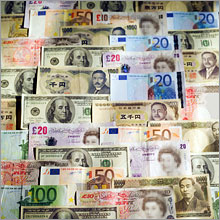The global imbalances equation: unchanged
 Friday, July 23, 2010 at 12:10AM
Friday, July 23, 2010 at 12:10AM 
Depressing bit from WAPO's Neil Irwin about how little has changed structurally since the Great Recession began:
The catastrophic economic downturn that began two years ago was supposed to shake up the global economy, ending an era in which Americans consumed too much and saved and exported too little.
But the recovery is being driven by a return to the very global imbalances that were a major cause of the crisis. Americans' savings rates have fallen over the past year, imports are rising faster than exports, and countries around the world are again turning to Americans to be the consumers of last resort.
"Despite all the good words and good intentions, I'm afraid we're going back to the same conditions that led us into this mess to begin with," said C. Fred Bergsten, director of the Peterson Institute for International Economics.
That's partly because countries around the world view those old ways, while dangerous over the long term, as the quickest option to power out of the deep economic decline. For China, Japan and Germany, that means exporting vast volumes of goods, saving too much and spending too little; for the United States, and to varying degrees Britain and other European nations, it is the reverse.
These trends are deeply ingrained in countries' policies and individual decisions by their citizens, such as the lack of a social safety net in China that causes people to save more and the mortgage-interest deductions in the United States that encourage people to take on more debt.
World leaders have pledged to guide the global economy away from those imbalances. Just this week, President Obama renewed his call for a doubling of U.S. exports. But that has been made more difficult given that the value of the dollar has risen 7.5 percent against other major currencies this year, making American exports more expensive.
Meanwhile, leaders in Germany and Japan have turned their focus to reducing budget deficits, but the rest of the world would benefit if those countries spent more aggressively, increasing their consumption.
The United States has been like a customer who outspends his paycheck by receiving store credit. The store -- in this case, China, which buys vast quantities of U.S. Treasury bonds -- essentially funnels its profit back to the customer in the form of more credit. Everybody is better off for a while; the customer gets more stuff, and the store does more business.
But that relationship can't go on forever.
Makes you wonder what level of crisis is required for real change.
I retreat to my old analysis: this crisis caught both China and the US about a decade too early. China needed more time to develop and gain confidence re: necessary reforms and reorienting more heavily toward domestic consumption, while the US needed a new generation of political leadership to emerge. Obama was the leading edge, all right, but not transformational enough on his own to create or lead the economic change, in part because of the perceived hostility between him and business.










Reader Comments (4)
The crisis was never allowed to run its course. The banks, financial institutions, businesses, unions, non governmental entities, ( the dinosaurs ) never died. They were bailed out with borrowed money. Of course things stayed the same, the money was spent to keep the status quo. Being from the business side, the hostility towards Obama is more than perceived it is real down to the molecular level.
It's easier to believe in the Keynesian Theory that you can spend your way out of insolvency than it is to walk instead of ride . .
No one wants to be the one that has to cease living in the style they have become accustomed, and to get this right, a lot of people must do that . .
Too many grasshoppers . . .
There is not enough time for a transformation to take place from within Washington. The powers in DC are driving us ever faster off an economic cliff.
The crisis that will cause real change is obvious: the hyper-inflation of the US dollar. This will happen when other countries begin dumping Dollar-denominated assets. This could happen within the next few years.
The collapsing Dollar will push US consumer prices through the roof, re-balancing the global economy.
'Makes you wonder what level of crisis is required for real change.'
Real change, if it is a significant advance, is a transformation. During recent past economic downturns, politicians, public, workers and investors just reacted with a minor balancing act towards repeat of a recent 'good time.' Transformations came after WW I, the Great Depression, WW II, and the Cold War.
We need to think of the finance sector of domestic and global economies as the center of a series of concentric circles linking other economic sectors, and adjusting $ flows based on returns, and risk/reward situations. That would reflect the Adam Smith perspective.
In the last decades we came to think of the finance sector as the rich top of an economic pyramid which all other economic sectors should invest in and give priority in decision making.
Adam Smith favored transparency and avoiding joining such a herd mentality, with an unknown risk reward factor.
America created and demonstrated through institutions like DARPA and NIST, significant new technologies in areas like smart grid superconductivity and high unit value agile manufacturing. Unfortunately, the artificially priced housing sector, and the financial sector gimmicks, seemed to provide better rewards for training or investing.
Now there is a lot of 'rescue' cash parked in financial institutions and stable economic sectors waiting to learn the impacts financial and medical care reforms will have on them.
I'm hoping they will pour that $ into investments, hiring, and training efforts in substantive services and products.